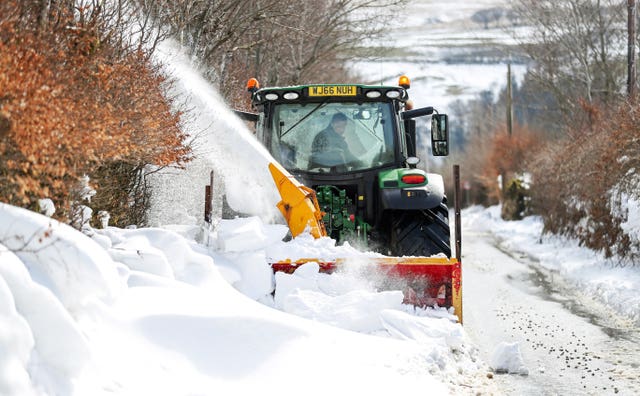
Scotland’s farmers lost up to £161 million last year due to the extreme weather, according to a report.
The losses equated to around 6% of the total agricultural output of the previous year, experts found.
READ MORE: Five farming deaths in Scotland this year
The livestock sector was hit hardest by the double impact of severe snow in March and higher feeding costs over the hot summer.
Environmental charity WWF Scotland said farmers were “increasingly on the front-line” of climate change as they work to cope with unpredictable seasons.
The Beast from the East snowstorm in March last year brought the most significant spell of severe winter weather since December 2010, with snow depths up to 50cm or more across upland areas.
 The Beast from the East brought substantial snowfall across the country last year (Andrew Matthews/PA)
The Beast from the East brought substantial snowfall across the country last year (Andrew Matthews/PA)
It was followed by the joint hottest summer on record for the UK.
The Economic Impact of Extreme Weather on Scottish Agriculture report was commissioned by WWF Scotland and compiled by economic consultancy Ecosulis.
It concluded that the severe weather of 2017/18 impacted on livestock numbers and yields of key crops.
Sheep farmers suffered the biggest hit as the Beast from the East swept in during lambing season, with losses of £45 million.
This was followed by wheat (£34 million), beef (£28 million), and barley (£26 million).
The report said: “The overall losses to Scottish agriculture are estimated at £161 million, equivalent to 6% of total output in 2017.
“In terms of animal deaths, the biggest impact was also on the sheep sector, the beef sector also suffered substantial losses, but the largest impact on beef was on the cost of forage and increased feeding due to the longer housing period.
“Due to a longer production cycle the impact on the beef sector is likely to be felt for some time.”
READ MORE: New entrants to farming bring new ideas
The report’s authors added that the poor weather may have contributed to the decision of some dairy farmers to cease production, and said some farmers may have experienced losses as a result of uncollected milk.
 Last summer was the joint hottest on record for the UK (Jonathan Brady/PA)
Last summer was the joint hottest on record for the UK (Jonathan Brady/PA)
“Losses to individual dairy farmers, however, were as high as £23,000,” the publication noted.
Cereal yields were also affected significantly and overall losses to the cereal sector were £62 million – equivalent to 15% of the sector’s output in 2017, the report noted.
Meanwhile, farmers also experienced building damage due to heavy snow and strong winds bringing down roofs and burst pipes.
Insurers also reported an increase in fires during June and July due to the exceptionally hot, dry summer.
Dr Sheila George, food policy manager at WWF Scotland, said: “Farmers are increasingly on the front-line of climate change, struggling with ever more unpredictable seasons and extreme weather.
“This report gives a snapshot of the huge financial toll, but behind these stats there is also a personal cost for farmers across the country.
“Last year’s extremes will soon be the norm rather than the exception and that will have huge implications for farmers and the environment. That’s why it’s so important the Scottish Government takes action now to support our agriculture sector to adapt to the challenges ahead.”
A Scottish Government spokesman said: “Our farmers, crofters and land managers are on the front line when it comes to dealing with unpredictable seasons and extreme weather.
“That is why we continue to engage with the industry to ensure that appropriate support is provided during challenging times.
“This has included offering support to our farming communities through the early payment of loans, securing derogations from European rules, and our continued support of the work of the Agricultural Weather Advisory Panel and Farm Advisory Service.
“We encourage all farmers, crofters and land managers to consider how they can look to improve the resilience of their business both financially and environmentally moving forward.”


Why are you making commenting on The Herald only available to subscribers?
It should have been a safe space for informed debate, somewhere for readers to discuss issues around the biggest stories of the day, but all too often the below the line comments on most websites have become bogged down by off-topic discussions and abuse.
heraldscotland.com is tackling this problem by allowing only subscribers to comment.
We are doing this to improve the experience for our loyal readers and we believe it will reduce the ability of trolls and troublemakers, who occasionally find their way onto our site, to abuse our journalists and readers. We also hope it will help the comments section fulfil its promise as a part of Scotland's conversation with itself.
We are lucky at The Herald. We are read by an informed, educated readership who can add their knowledge and insights to our stories.
That is invaluable.
We are making the subscriber-only change to support our valued readers, who tell us they don't want the site cluttered up with irrelevant comments, untruths and abuse.
In the past, the journalist’s job was to collect and distribute information to the audience. Technology means that readers can shape a discussion. We look forward to hearing from you on heraldscotland.com
Comments & Moderation
Readers’ comments: You are personally liable for the content of any comments you upload to this website, so please act responsibly. We do not pre-moderate or monitor readers’ comments appearing on our websites, but we do post-moderate in response to complaints we receive or otherwise when a potential problem comes to our attention. You can make a complaint by using the ‘report this post’ link . We may then apply our discretion under the user terms to amend or delete comments.
Post moderation is undertaken full-time 9am-6pm on weekdays, and on a part-time basis outwith those hours.
Read the rules here